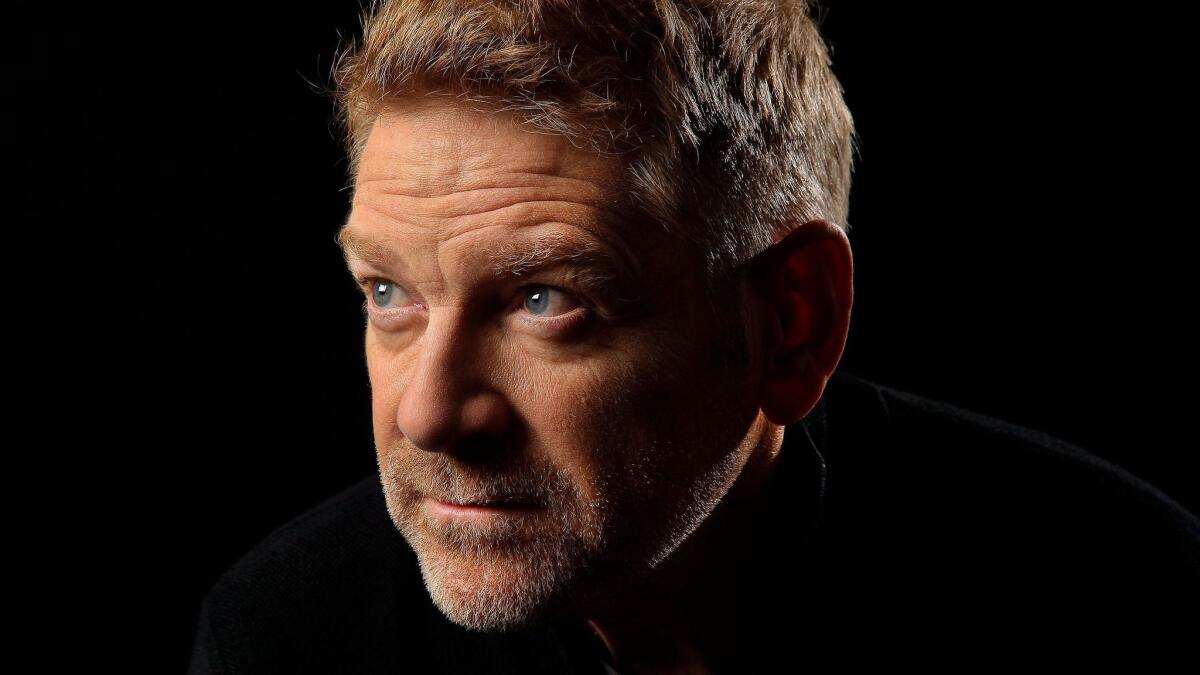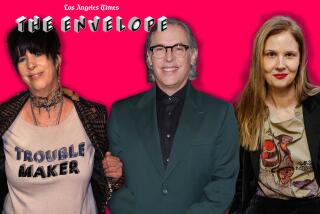Kenneth Branagh on Poirot’s mustache as superpower and his reboot of ‘Murder on the Orient Express’

- Share via
Right off the bat, representatives of Agatha Christie’s estate had a question for actor and director Kenneth Branagh when they met the first time about adapting the late author’s classic 1934 novel “Murder on the Orient Express.”
“What are you going to do about the mustache?”
Christie’s brilliant Belgian detective Hercule Poirot, the protagonist of “Murder on the Orient Express” and 32 other mystery novels, was arguably the author’s most famous fictional creation, so renowned that in 1975 his death in the novel “Curtain” was marked with a front-page New York Times obituary. Of course, Poirot’s most famous feature, aside from his razor-sharp mind, was his prodigious mustache.
Christie herself had been dissatisfied with the curlicued mustache that actor Albert Finney wore as Poirot in director Sidney Lumet’s 1974 adaptation of “Murder on the Orient Express,” deeming it insufficiently impressive. For his lavish, star-studded new version, in which he stars as Poirot and which hits theaters today, Branagh knew he needed to go big.
“We knew Poirot’s mustache was a sort of critical visual and a chance to mark this as a new departure,” Branagh says on a recent Saturday morning in Santa Monica. “It is his superpower. It’s his people-tester: Why would you take that guy seriously? And then suddenly he’s got you by the throat.”
After trying in vain to grow the mustache himself, Branagh and his team spent six months developing what are unquestionably the most elaborate Poirot whiskers ever to grace the screen.
The size and shape of a character’s mustache may seem a relatively trivial matter. But when it comes to adapting a work as beloved as “Murder on the Orient Express” — from an author listed in the Guinness Book of World Records as the bestselling novelist of all time — there is little that is trivial.
Once we understand who and how and why, the interesting moral coda, if you like, was: And now what? What is justice?
— Kenneth Branagh, director and actor
Arguably Christie’s best-known novel, “Murder on the Orient Express” chronicles Poirot’s efforts to solve the murder of a mobster on a train ride from Istanbul to Paris, with each of his fellow passengers a potential suspect in the crime. Budgeted at $55 million, Branagh’s film — which costars, among others, Judi Dench, Johnny Depp, Daisy Ridley, Michelle Pfeiffer, Josh Gad, Willem Dafoe and Penelope Cruz — represents just the latest in a long string of versions of the story over the decades in radio, film, TV and even video-game form.
Indeed, given how well-traveled the terrain has been, the question that immediately arose for Branagh was: why undertake a new “Murder on the Orient Express” in the first place? Aside from a bigger mustache, what could a new version offer that audiences haven’t seen before?
For the actor and filmmaker, who has brought numerous adaptations of Shakespeare plays like “Hamlet,” “Henry V,” “Othello” and “Much Ado About Nothing” to the big screen, such questions were nothing new. “When you revisit a classic, the first question you ask is, do you personally yourself feel an excitement?” Branagh says. “Do you feel a now-ness about it? Do you feel there’s an authentic reason, other than for sentimental reasons, to do it again? And I did feel that.”
Lumet’s 1974 film version, which proved a commercial hit and earned six Oscar nominations, had been a relatively light-hearted affair. But in screenwriter Michael Green’s new take on the story, Branagh saw the potential to further explore its characters and delve more deeply into some of the darker and thornier moral and emotional issues that the murder plot raises.
“Lumet declared that he wished his film to be a romp, and I enjoy that romp enormously,” Branagh says. “But I wanted this to be more of a brood on the hows and whys of disguising and hiding and channeling pain. Once we understand who and how and why, the interesting moral coda, if you like, was: And now what? What is justice? Where does conscience lie here?”
In its fundamental essence, though, Branagh wanted to keep his version faithful to the source material. Granted, a period-set mystery that unfolds on a luxury train might carry a whiff of “Masterpiece Theater” somewhat at odds with the expectations of modern moviegoers — particularly younger ones who may be less familiar with Christie’s work. Still, no one wanted to radically reinvent the story by, say, relocating it to a spaceship or pumping up the wow factor with visual-effects pyrotechnics.
“In every meeting, there’s somebody in the room going, ‘But when are we blowing up the train?’ ” Green says. “But that’s not the version anyone was on board for. This had the potential to be an elegant piece, and that’s what we strove for. If we could make the emotions feel real and if we could make the characterizations engaging and grounded, that would be spectacle enough.”
Of course, anyone adapting a whodunit as widely read as “Murder on the Orient Express” also has to contend with the simple fact that many viewers may, in fact, know going in precisely who done it. But Branagh, for one, wasn’t too concerned about that.
“My own experience anecdotally is that this is the kind of title about which people fib a bit about whether they’ve read it or not,” he says. “And if they have read it, I’ve found they’ve not necessarily remembered how it ends. I read a lot of crime fiction and it’s in one ear out the other. Frankly, the journey is everything.”
Christie, who died in 1976, was famously prickly about adaptations of her work, to the extent that, in her later years, she was often advised to simply not watch them at all. She was steered away from ever seeing the 1965 film “The Alphabet Murders,” featuring Tony Randall as Poirot, for example, writing, “My friends and publishers told me the agony would be too great.”
But James Prichard, the author’s great-grandson and CEO of Agatha Christie Ltd., which manages the rights to her works, says he’s learned not to even attempt to divine what Christie would have wanted to see.
“This is an incredible responsibility, but I can’t second-guess what she would have thought,” Prichard says, noting that during her life Christie refused to even allow Poirot’s image to appear on book covers, feeling it would rob the readers of their own imagination of him. “She was far cleverer than I will ever be, and her views — who can tell, really? We’re here to respect her works and to try and create the best adaptations of those works that we can.”
Branagh knows that an old-fashioned mystery yarn aimed at a largely adult audience — with an intricately plotted story line involving a lot of what Green calls “plate-spinning and data points” — may not be the easiest sell in today’s market. That said, he’s been in plenty of pressure-cooker situations before, perhaps most notably when he directed the 2011 Marvel Studios superhero film “Thor.”
“There were a lot of things on the line then that were pretty scary,” Branagh says. “I’m the 47-year-old Shakespeare guy who’s being given a kind of last shot in Hollywood. You’ve got guys in tights riding on horses over a rainbow bridge in space. Jesus Christ, we were sweating.” He smiles. “I remember [Marvel Studios president] Kevin Feige going, “Ken, just don’t let Thor look like Fabio.’ ” (In the end, the film proved a blockbuster, grossing nearly $450 million worldwide.)
Branagh, Prichard and 20th Century Fox, which is releasing “Murder on the Orient Express,” are all hopeful that this newest film could spawn an ongoing series of Poirot films — and with scores of novels and short stories, there is clearly no shortage of material from which to draw. Meanwhile, numerous other Christie adaptations are already in the works. Amazon recently acquired the rights to seven upcoming BBC TV movies based on the author’s works, and Ben Affleck is developing a film adaptation of Christie’s courthouse drama “Witness for the Prosecution.”
At the moment, though, until the box office returns for “Murder on the Orient Express” start pouring in, not even Poirot himself could deduce whether sequels will be in the cards.
“I think everybody knew that it’s a tallish order in a very competitive world to bring something like this off,” Branagh says. “The moviegoing environment and the ways in which we enjoy our entertainment are so various and volatile and ever-changing that there’s no certainty about anything. But my gut tells me that we have a shot. And if not, we’re all very proud of this movie — and we’ll live to fight another day.”
This much, at least, is safe to say: Whether “Murder on the Orient Express” takes off or falls short, no one can argue the mustache was too small.
Twitter: @joshrottenberg
More to Read
Only good movies
Get the Indie Focus newsletter, Mark Olsen's weekly guide to the world of cinema.
You may occasionally receive promotional content from the Los Angeles Times.











